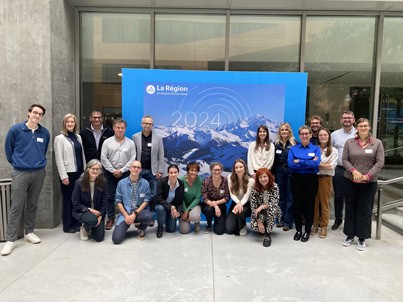GLOBAL CONTEXT
Global plastic waste generation more than doubled from 2000 to 2019 to 353 million tonnes. Nearly two-thirds of plastic waste comes from plastics with lifetimes of under five years, with 40% coming from packaging, 12% from consumer goods and 11% from clothing and textiles.
Reducing pollution from plastics will require action, and international co-operation, to reduce plastic production, including through innovation, better product design and developing environmentally friendly alternatives, as well as efforts to improve waste management and increase recycling.
EUROPEAN CONTEXT
The Alpine textile and plastic industries count major producing regions. They also share a reliance on common raw materials (polymers), and applications in identical sectors like mountain products and equipment, which are essential items in the economic development of mountain areas.
These industries have accelerated their green transition, thanks to significant efforts in innovation and regulations. Yet, there is consequent room for improvement:
- In filling the gap to reach carbon neutrality, with a share in worldwide greenhouse gases emissions of 3,4% for plastics and 10% for textiles.
- In improving resource sensitivity, regarding raw materials (vastly imported) and industrial impact on the environment (local production and its upstream and downstream activities).
Waste mitigation is a major lever for improvement: waste avoidance and performant waste management reduce the environmental impacts such as microplastic pollution or non-biodegradable rejects. Efficient waste mitigation generates positive economic impact with the creation of activities (e.g. repair shops) and induces an improved resource sensitivity (e.g. raw materials from recycling).
ASTER’S PROJECT
ASTER is an interreg Alpine Space project that gathers textile and plastic ecosystems to promote the transition to a circular and resource efficient economy.
The 11 partners from Austria, France, Germany, Italy, Slovenia evaluate the current framework and solutions for waste prevention and management.
They then develop common practices, policies, and regulations tailored for the Alps.
By mobilising stakeholders with a shared goal, ASTER aims to improve the prevention and management of textile and plastic waste in the Alps by providing pathways to harmonise policies and regulations across the region.
The 36-month project is organized around 3 groups of activities designed to ensure its operational deployment :
-
CHARACTERIZING WASTE PREVENTION AND MANAGEMENT
This work package aims is to build knowledge by understanding the geographical, legal, technical, and political framework of textile and plastic waste prevention and management in the Alps.
-
ALPINE PATHWAYS TO BETTER PREVENT AND MANAGE WASTE
This work package aims is to prototyp and test the circular principles (5R) including eco-design for mountain products to avoid waste. Analysis of feasible secondary raw materials based on waste management (WP1), recycling, new business models (reuse, repair, PaaS, take-back).
-
SOLUTIONS TRANSFER TO THE ECOSYSTEM
This work package aims is to provide by developing and disseminating solutions for the implementation of 5R strategies and the establishment of circular & resource efficient value chains for textile and plastic products, especially for applications in mountain products



